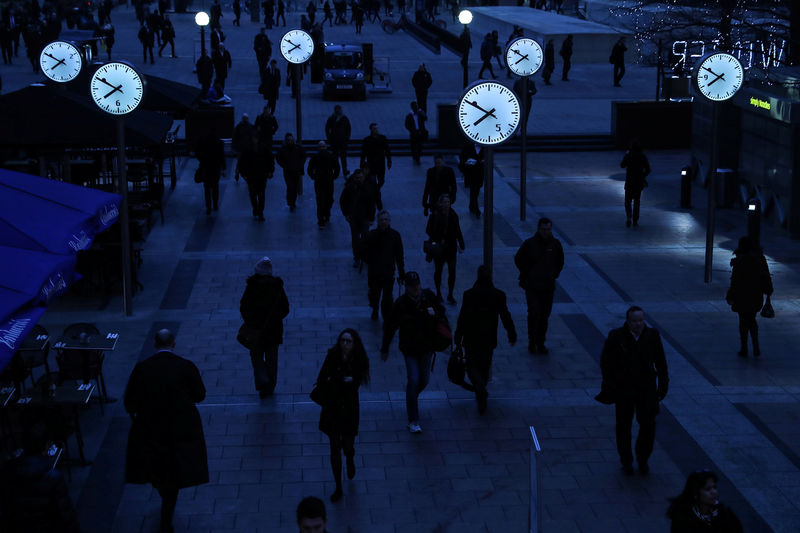By Andy Bruce
LONDON (Reuters) - Ten years after the financial crash that hit Western countries 10 years ago, triggering recessions, many of the scars on Britain's economy have yet to heal - despite more than eight years of growth, and employment levels that have regularly hit record highs.
Below is a summary of how the world's fifth-biggest economy, is still struggling to recover, a decade on from the collapse of Lehman Brothers.
WAGES
Wages in inflation-adjusted terms are no higher today than they were in 2005.
While far fewer companies went bankrupt in the 2008/09 recession than in 1992, workers bore the brunt of the financial crisis with below-inflation pay rises.
The Bank of England has long said wage growth will improve as the unemployment rate falls, but there have been a number of false starts, and annual pay growth has hovered around 2.5 percent, compared to an average of 4 percent before the crisis.
(For an interactive graphic on 'Britain's financial crisis scars' click https://tmsnrt.rs/2NAf6gs)
PRODUCTIVITY
Productivity in Britain has stagnated and has played a key role in squeezing Britons' living standards.
Over the past 10 years, productivity growth was the weakest since modern records began and appears to be the slowest since the early 1820s, when Britain was emerging from the Napoleonic wars, the Office for National Statistics estimates.
Economists are puzzled over why Britain's productivity growth is so poor compared with other advanced economies. Theories over the years include a lack of investment, poor management, low interest rates that keep alive unproductive "zombie companies", and mismeasurement of an increasingly high-tech and services-driven economy.
(For a graphic on 'UK productivity growth' click https://reut.rs/2OALigK)
HOUSING MARKET
Activity in Britain's housing market remains well below levels seen before the financial crisis.
Mortgage approvals are 40 percent lower than before the crisis. House-building, too, remains below levels seen before 2008, contributing to a rise in house prices that has priced many people out of the market.
House prices themselves are 17 percent above their pre-crisis peak, though this masks widespread regional differences. In London, they are 60 percent above their previous peak; in Northern Ireland, they are still down 40 percent.
(For a graphic on 'UK housing market activity' click https://reut.rs/2OYcvdg)
GOVERNMENT DEBT
Government debt ballooned after the crisis and progress in repairing the government's balance sheet has been slow, despite nearly a decade of spending restraint.
Britain committed to a policy of austerity in 2010 in response to one of the world's highest budget deficits as a share of GDP. This -- combined with weak overseas demand due to the euro zone debt crisis -- slowed the economy, and the gap between the government's spending and tax revenues closed much more slowly than anticipated. Public debt as a share of GDP only began to fall in 2016 and is still more than double its pre-crisis share of economic output.
(For a graphic on 'UK government debt to GDP' click https://tmsnrt.rs/2CUKHFF)
FACTORY OUTPUT
Manufacturing was badly bruised in previous recessions -- such as in the early 1980s when it took eight years for output to recover -- but the financial crisis was a crushing blow to the sector, which accounts for about 10 percent of the economy.
A slump in global trade meant British factories could not capitalize on a sharp fall in the value of the pound. By 2014, the number of British manufacturers employing more than 250 people had fallen by around a sixth, official data show.
Today, manufacturing output remains about 3 percent lower than before the crisis. In the much bigger services sector, output is now 14 percent above pre-crisis levels.
The picture in France and Italy is similar.
(For a graphic on 'Manufacturing and services output' click https://reut.rs/2P2gIwE)

(Writing and graphics by Andy Bruce; Editing by Kevin Liffey)